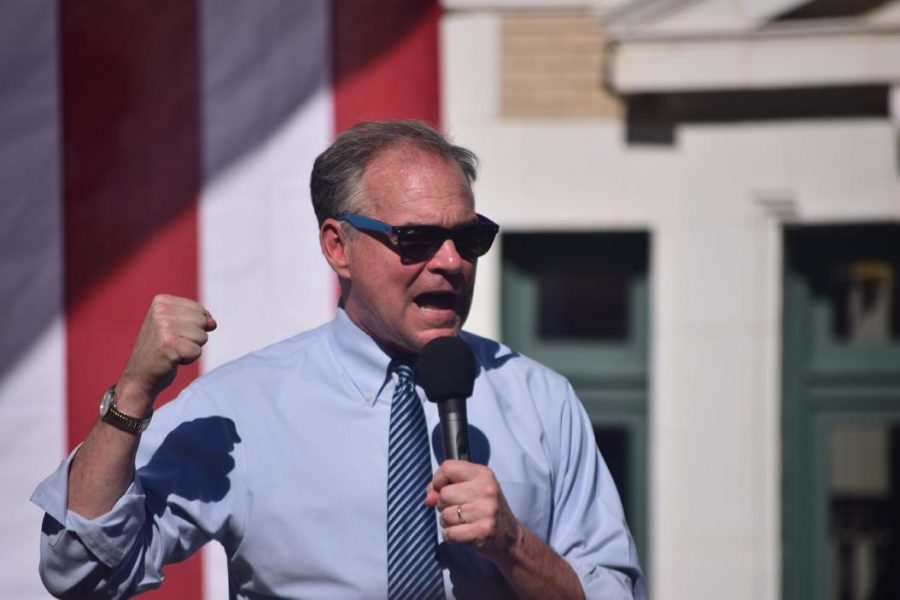Zachary Goldstein loves living in Pittsburgh, but not for the hot cakes or the Cathedral. He loves living in the city because Pennsylvania is a swing state.
With the presidential election less than five weeks away, high-profile representatives from both the Republican and Democratic parties have been making frequent stops in cities across Pennsylvania, often including Pittsburgh.
On Thursday afternoon, Democratic vice presidential candidate Tim Kaine made a campaign stop at Carnegie Mellon University’s campus.
Goldstein, a first-year undeclared major at CMU and a New York native, isn’t used to candidates paying much attention to his state.
“New York’s not a swing state,” Goldstein said about his state that has elected a Democrat since 1988. “We never got to see candidates.”
Kaine geared his speech toward millennials, encouraging the audience of students and community members to exercise their right to vote on the Nov. 8, presidential election. According to CMU spokesperson Ken Walters, about 800 students and community members attended Kaine’s speech.
Over the course of the presidential race, candidates have focused campaign efforts on several key swing states — which could vote for a Democrat or Republican — including Pennsylvania. Of likely Pennsylvania voters under the age of 35, a late September Franklin & Marshall poll reported 55 percent support Hillary Clinton while 19 percent Donald Trump.
His trip to CMU was Kaine’s third visit to Pittsburgh since Democratic presidential candidate Clinton chose Kaine as her running mate in late July. On July 30, the Democratic duo made a campaign stop at the David Lawrence Convention Center Downtown. More recently, Kaine spoke alongside current Vice President Joe Biden at Pittsburgh’s Labor Day Parade.
Goldstein only had to walk a short way across campus to watch Kaine speak. Kaine covered subjects ranging from Republican candidate Trump’s book –– “Crippled America,” recently renamed to “Great Again” –– to the vice presidential debate that took place Tuesday night.
Kaine directed Thursday’s speech at the college-aged population, using the story of Barbara Johns to illustrate the amount of change young people are capable of making.
In 1951, Johns was a 16-year-old high school student in Farmville, Virginia, Kaine said. Outraged at the poor quality of education at her segregated high school, Jones –– who was black –– staged a student strike to protest unequal schooling.
The court case that arose out of the strike –– David v. Prince Edward County –– was consolidated into the larger Brown v. Board of Education. In 1954, Brown v. Board of Education declared the segregation of public schools to be unconstitutional, ending the era of “separate but equal” education.
To Kaine, Johns’ story is a clear indication of the power of the young –– including the millennial generation –– to spearhead change.
“I talk about Barbara Johns because equality is at stake in this election,” Kaine said. “You all can do it, too, and that’s what’s so great about this country.”
Goldstein, who plans on voting for Clinton and Kaine, said he appreciates both Clinton’s and Kaine’s years of experience in the political field.
“I like how [Kaine is] really experienced and has experience at all ranges of government,” Goldstein said. “He seems like a very compassionate, genuine, good person.”
Fifth-year CMU graduate student Bret Vukoder plans to vote for Clinton and Kaine, but said he understood others’ positive reactions to Republican candidate Mike Pence because of the candidate’s eloquence in Tuesday’s vice presidential debate.
Though Vukoder said he thought Kaine made stronger and more logical points than Pence, he said the Pence’s smooth speaking style may have swayed viewers to the Republican side. Vukoder said this was in part due to the candidate’s previous experience as a radio and talk show host in the ’90s.
Vukoder said others’ reactions to the debate made him realize how often people pay more attention to the presentation of the candidates’ argument than to the arguments themselves.
“Seeing the reaction made me a little disillusioned to the extent to which we rely on what we see,” Vukoder said.
Despite this, Vukoder said Kaine brought up points during the debate to open up a conversation that would survive past Tuesday night.
“[Kaine] knew that he had to plant the seeds so that there could be a dialogue beyond the debate,” Vukoder said. “The debate goes beyond the debate.”
Throughout Kaine’s speech at CMU, he emphasized the importance of Americans uniting not only as citizens, but as voters.
“We have to win this election, there’s no room for second place here,” Kaine said. “You do the work you need to do, and come Nov. 8th, we’re going to win big.”


